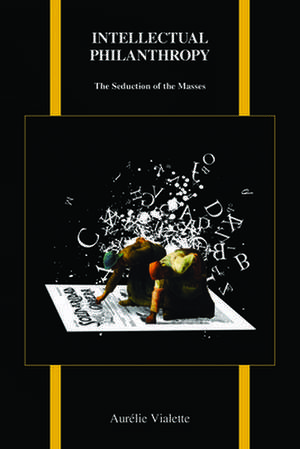Intellectual Philanthropy: Purdue Studies in Romance Literatures
Autor Aurélie Vialetteen Limba Engleză Paperback – 15 aug 2018
Din seria Purdue Studies in Romance Literatures
-
 Preț: 353.67 lei
Preț: 353.67 lei -
 Preț: 303.87 lei
Preț: 303.87 lei -
 Preț: 344.96 lei
Preț: 344.96 lei -
 Preț: 353.61 lei
Preț: 353.61 lei -
 Preț: 165.47 lei
Preț: 165.47 lei -
 Preț: 360.98 lei
Preț: 360.98 lei -
 Preț: 359.23 lei
Preț: 359.23 lei -
 Preț: 350.78 lei
Preț: 350.78 lei -
 Preț: 366.15 lei
Preț: 366.15 lei -
 Preț: 347.62 lei
Preț: 347.62 lei -
 Preț: 339.09 lei
Preț: 339.09 lei -
 Preț: 273.67 lei
Preț: 273.67 lei -
 Preț: 244.08 lei
Preț: 244.08 lei -
 Preț: 243.54 lei
Preț: 243.54 lei -
 Preț: 249.09 lei
Preț: 249.09 lei -
 Preț: 202.78 lei
Preț: 202.78 lei -
 Preț: 248.15 lei
Preț: 248.15 lei -
 Preț: 247.95 lei
Preț: 247.95 lei -
 Preț: 242.55 lei
Preț: 242.55 lei -
 Preț: 247.95 lei
Preț: 247.95 lei -
 Preț: 243.15 lei
Preț: 243.15 lei -
 Preț: 433.03 lei
Preț: 433.03 lei -
 Preț: 408.02 lei
Preț: 408.02 lei -
 Preț: 238.70 lei
Preț: 238.70 lei -
 Preț: 260.66 lei
Preț: 260.66 lei -
 Preț: 250.06 lei
Preț: 250.06 lei -
 Preț: 352.70 lei
Preț: 352.70 lei -
 Preț: 352.70 lei
Preț: 352.70 lei -
 Preț: 355.37 lei
Preț: 355.37 lei -
 Preț: 349.81 lei
Preț: 349.81 lei -
 Preț: 242.17 lei
Preț: 242.17 lei -
 Preț: 362.32 lei
Preț: 362.32 lei -
 Preț: 166.64 lei
Preț: 166.64 lei -
 Preț: 354.59 lei
Preț: 354.59 lei -
 Preț: 356.55 lei
Preț: 356.55 lei -
 Preț: 346.87 lei
Preț: 346.87 lei -
 Preț: 354.61 lei
Preț: 354.61 lei -
 Preț: 349.15 lei
Preț: 349.15 lei -
 Preț: 357.49 lei
Preț: 357.49 lei -
 Preț: 351.87 lei
Preț: 351.87 lei -
 Preț: 372.02 lei
Preț: 372.02 lei -
 Preț: 355.58 lei
Preț: 355.58 lei -
 Preț: 347.83 lei
Preț: 347.83 lei -
 Preț: 351.87 lei
Preț: 351.87 lei -
 Preț: 348.83 lei
Preț: 348.83 lei -
 Preț: 352.70 lei
Preț: 352.70 lei -
 Preț: 256.63 lei
Preț: 256.63 lei -
 Preț: 203.42 lei
Preț: 203.42 lei
Preț: 355.49 lei
Nou
Puncte Express: 533
Preț estimativ în valută:
68.03€ • 70.76$ • 56.16£
68.03€ • 70.76$ • 56.16£
Carte tipărită la comandă
Livrare economică 15-29 aprilie
Preluare comenzi: 021 569.72.76
Specificații
ISBN-13: 9781557538239
ISBN-10: 1557538239
Pagini: 294
Dimensiuni: 152 x 229 x 16 mm
Greutate: 0.43 kg
Editura: Purdue University Press
Seria Purdue Studies in Romance Literatures
ISBN-10: 1557538239
Pagini: 294
Dimensiuni: 152 x 229 x 16 mm
Greutate: 0.43 kg
Editura: Purdue University Press
Seria Purdue Studies in Romance Literatures
